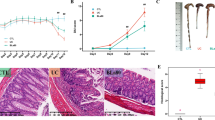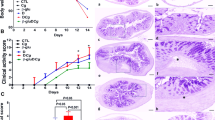Abstract
The aim of this study was to clarify the effect of the spore-forming and lactic acid-producing probiotic strain, Bacillus coagulans SANK 70258, on human colonic microbiota of healthy subjects and ulcerative colitis patients. A model culture system was employed to construct the in vitro human colonic microbiota, to retain the bacterial species richness and simulate the patient’s disordered composition, from the fecal inoculum. Bacterial 16S rRNA gene sequencing confirmed that administration of B. coagulans SANK 70258 (at an initial concentration of 4 × 107-total cells/mL) suppressed bacteria related to the family Enterobacteriaceae in the microbiota models for both healthy subjects (P = 0.016) and ulcerative colitis patients (P = 0.023). In addition, administration of B. coagulans SANK 70258 increased bacteria related to the family Lachnospiraceae (P = 0.031), thereby enhancing butyrate production (P = 0.031) in the microbiota models of healthy subjects. However, these changes were not observed in the microbiota models of ulcerative colitis patients, likely owing to the low abundance of Lachnospiraceae species. This study demonstrates the potential of B. coagulans SANK 70258 to exhibit antimicrobial activity against harmful organisms in patients with ulcerative colitis, while improving the intestinal microenvironment by increasing butyrogenesis in healthy persons.
Key Points
• B. coagulans SANK 70258 treatment reduced colonic Enterobacteriaceae species.
• B. coagulans SANK 70258 treatment enhanced butyrogenesis in healthy individuals.
• B. coagulans SANK 70258 treatment increased Lachnospiraceae in healthy persons.
• B. coagulans SANK 70258 improves the colonic microenvironment in ulcerative colitis.




Similar content being viewed by others
Data availability
All raw sequence data generated in this study have been deposited in MG-RAST as “Model Culture System of Human Colonic Microbiota_Bacillus coagulans SANK 70258” under the accession numbers mgm4856204.3–mgm4856248.3.
References
Ara K, Meguro S, Hase T, Tokimitsu I, Otsuji K, Kawai S, Ito S, Iino H (2002) Effect of spore-bearing lactic acid-forming bacteria (Bacillus coagulans SANK 70258) administration on the intestinal environment, defecation frequency, fecal characteristics and dermal characteristics in humans and rats. Microb Ecol Health Dis 14:4–13. https://doi.org/10.1080/089106002760002694
Caporaso JG, Kuczynski J, Stombaugh J, Bittinger K, Bushman FD, Costello EK, Fierer N, Peña AG, Goodrich JK, Gordon JI, Huttley GA, Kelley ST, Knights D, Koenig JE, Ley RE, Lozupone CA, McDonald D, Muegge BD, Pirrung M, Reeder J, Sevinsky JR, Turnbaugh PJ, Walters WA, Widmann J, Yatsunenko T, Zaneveld J, Knight R (2010) QIIME allows analysis of high-throughput community sequencing data. Nat Methods 7:335–336. https://doi.org/10.1038/nmeth.f.303
Carding S, Verbeke K, Vipond DT, Corfe BM, Owen LJ (2015) Dysbiosis of the gut microbiota in disease. Microb Ecol Health Dis 26:26191. https://doi.org/10.3402/mehd.v26.26191
Chibbar R, Dieleman LA (2015) Probiotics in the management of ulcerative colitis. J Clin Gastroenterol 49:S50–S55. https://doi.org/10.1097/MCG.0000000000000368
Cutting SM (2011) Bacillus probiotics. Food Microbiol 28:214–220. https://doi.org/10.1016/j.fm.2010.03.007
Edgar RC (2010) Search and clustering orders of magnitude faster than BLAST. Bioinformatics 26:2460–2461. https://doi.org/10.1093/bioinformatics/btq461
Elshaghabee FMF, Rokana N, Gulhane RD, Sharma C, Panwar H (2017) Bacillus as potential probiotics: status, concerns, and future perspectives. Front Microbiol 8:1490. https://doi.org/10.3389/fmicb.2017.01490
Fitzpatrick LR, Small JS, Greene WH, Karpa KD, Keller D (2011) Bacillus coagulans GBI-30 (BC30) improves indices of Clostridium difficile-induced colitis in mice. Gut Pathog 3:16. https://doi.org/10.1186/1757-4749-3-16
Fritzpatrick LR, Small JS, Greene WH, Karpa KD, Farmer S, Keller D (2012) Bacillus coagulans GBI-30, 6086 limits the recurrence of Clostridium difficile-induced colitis following vancomycin withdrawal in mice. Gut Pathog 4:13. https://doi.org/10.1186/1757-4749-4-13
Hamer HM, Jonkers D, Venema K, Vanhoutvin S, Troost FJ, Brummer RJ (2008) Review article: the role of butyrate on colonic function. Aliment Pharmacol Ther 27:104–119. https://doi.org/10.1111/j.1365-2036.2007.03562.x
Honda H, Gibson GR, Farmer S, Keller D, McCartney AL (2011) Use of a continuous culture fermentation system to investigate the effect of GanedenBC30 (Bacillus coagulans GBI-30, 6086) supplementation on pathogen survival in the human gut microbiota. Anaerobe 17:36–42. https://doi.org/10.1016/j.anaerobe.2010.12.006
Hong HA, Duc le H, Cutting SM (2005) The use of bacterial spore formers as probiotics. FEMS Microbiol Rev 29:813–835. https://doi.org/10.1016/j.femsre.2004.12.001
Hyronimus B, Le Marrec C, Urdaci MC (1998) Coagulin, a bacteriocin-like inhibitory substance produced by Bacillus coagulans I4. J Appl Microbiol 85:42–50. https://doi.org/10.1046/j.1365-2672.1998.00466.x
Joseph B, Dhas B, Heng V, Raj J (2013) Bacteriocin from Bacillus subtilis as a novel drug against diabetic foot ulcer bacterial pathogens. Asian Pac J Trop Biomed 3:942–946. https://doi.org/10.1016/S2221-1691(13)60183-5
Klindworth A, Pruesse E, Schweer T, Peplies J, Quast C, Horn M, Glöckner FO (2013) Evaluation of general 16S ribosomal RNA gene PCR primers for classical and next-generation sequencing-based diversity studies. Nucleic Acids Res 41:e1. https://doi.org/10.1093/nar/gks808
Kumari R, Ahuja V, Paul J (2013) Fluctuations in butyrate-producing bacteria in ulcerative colitis patients of North India. World J Gastroenterol 19:3404–3414. https://doi.org/10.3748/wjg.v19.i22.3404
Lane ER, Zisman TL, Suskind DL (2017) The microbiota in inflammatory bowel disease: current and therapeutic insights. J Inflamm Res 10:63–73. https://doi.org/10.2147/JIR.S116088
Louis P, Flint HJ (2009) Diversity, metabolism and microbial ecology of butyrate-producing bacteria from the human large intestine. FEMS Microbiol Lett 294:1–8. https://doi.org/10.1111/j.1574-6968.2009.01514.x
Majeed M, Nagabhushanam K, Arumugam S, Majeed S, Ali F (2018) Bacillus coagulans MTCC 5856 for the management of major depression with irritable bowel syndrome: a randomized, double-blind, placebo controlled, multi-centre, pilot clinical study. Food Nutr Res 62:1218. https://doi.org/10.29219/fnr.v62
Mashita T, Shimizu K, Ogasawara M, Nakajima M (1964) Basic clinical study on Nakayama spore-forming lactic acid bacteria. J New Rem Clin 13:977–982 http://mol.medicalonline.jp/library/archive/search?jo=aa9syrsc&ye=1964&vo=13&nu=9&UserID=150.84.188.56 (in Japanese)
Nakayama O, Yanoshi M (1967a) Spore-bearing lactic acid bacteria isolated from rhizosphere. I Taxonomic studies on Bacillus laevolacticus nov sp and Bacillus racemilacticus nov sp. J Gen Appl Microbiol 13:139–153. https://doi.org/10.2323/jgam.13.139
Nakayama O, Yanoshi M (1967b) Spore-bearing lactic acid bacteria isolated from rhizosphere.II Taxonomic studies on the catalase negative strains. J Gen Appl Microbiol 13:155–165. https://doi.org/10.2323/jgam.13.155
Nyangale EP, Farmet S, Cash HA, Keller D, Chernoff D, Gibson GR (2015) Bacillus coagulans GBI-30, 6086 modulates Faecalibacterium prausnitzii in older men and women. J Nutr 145:1446–1452. https://doi.org/10.3945/jn.114.199802
Riazi S, Wirawan RE, Badmaev V, Chikindas ML (2009) Characterization of lactosporin, a novel antimicrobial protein produced by Bacillus coagulans ATCC 7050. J Appl Microbiol 106:1370–1377. https://doi.org/10.1111/j.1365-2672.2008.04105.x
Rodiño-Janeiro BK, Vicario M, Alonso-Cotoner C, Pascua-García R, Santos J (2018) A review of microbiota and irritable bowel syndrome: future in therapies. Adv Ther 35:289–310. https://doi.org/10.1007/s12325-018-0673-5
Rogha M, Esfahani MZ, Zargarzadeh AH (2014) The efficacy of a synbiotic containing Bacillus coagulans in treatment of irritable bowel syndrome: a randomized placebo-controlled trial. Gastroenterol Hepatol Bed Bench 7:156–163
Sanders ME, Morelli L, Tompkins TA (2003) Sporeformers as human probiotics: Bacillus, Sporolactobacillus, and Brevibacillus. Compr Rev Food Sci Food Saf 2:101–110. https://doi.org/10.1111/j.1541-4337.2003.tb00017.x
Sasaki D, Sasaki K, Ikuta N, Yasuda T, Fukuda I, Kondo A, Osawa R (2018) Low amounts of dietary fibre increase in vitro production of short-chain fatty acids without changing human colonic microbiota structure. Sci Rep 8:435. https://doi.org/10.1038/s41598-017-18877-8
Sasaki K, Inoue J, Sasaki D, Hoshi N, Shirai T, Fukuda I, Azuma T, Kondo A, Osawa R (2019) Construction of a model culture system of human colonic microbiota to detect decreased Lachnospiraceae abundance and butyrogenesis in the feces of ulcerative colitis patients. Biotechnol J 14:e1800555. https://doi.org/10.1002/biot.201800555
Takagi R, Sasaki K, Sasaki D, Fukuda I, Tanaka K, Yoshida K, Kondo A, Osawa R (2016) A single-batch fermentation system to simulate human colonic microbiota for high-throughput evaluation of prebiotics. PLoS One 11. https://doi.org/10.1371/journal.pone.0160533
Urgesi R, Casale C, Pistelli R, Rapaccini GL, de Vitis I (2014) A randomized-double-blind placebo-controlled clinical trial on efficacy and safety of association of simethicone and Bacillus coagulans (Colinox®) in patients with irritable bowel syndrome. Eur Rev Med Pharmacol Sci 18:1344–1353 https://www.europeanreview.org/article/7357
Wang Q, Garrity GM, Tiedje JM, Cole JR (2007) Naive Bayesian classifier for rapid assignment of rRNA sequences into the new bacterial taxonomy. Appl Environ Microbiol 73:5261–5267. https://doi.org/10.1128/AEM.00062-07
Wang L, Cai Y, Zhu L, Guo H, Yu B (2014) Major role of NAD-dependent lactate dehydrogenase in the production of L-lactic acid with high optical purity by the thermophilic Bacillus coagulans. Appl Environ Microbiol 80:7134–7141. https://doi.org/10.1128/AEM.01864-14
Watanabe Y, Fukuda R, Tsutsumi T (2018) Effects of intake of Bacillus coagulans SANK 70258, “spore-forming lactic acid bacteria” on bowel movement in healthy volunteers–a randomized, double-blind, placebo-controlled, parallel-group study. Jpn Pharmacol Ther 46(9):1549–1558 http://www.pieronline.jp/content/article/0386-3603/46090/1549 (in Japanese)
Acknowledgments
We are grateful to Ayami Fu**o, Yasunobu Takeshima, Yasuko Koura, Shoko Sakai, and Kimiko Enda (Kobe University) for their analytical support.
Funding
Our research was funded by the Japan Society for the Promotion of Science (JSPS) (Grant Numbers 18K05487 for K.S. and 17K12897 for D.S.).
Author information
Authors and Affiliations
Contributions
KS, TM, RY, and AK contributed to the major design of this study. KS, DS, JI, and NH contributed to data acquisition and analysis related to the model culture system. KS, DS, TM, and RY contributed to microbiota analysis. KS, NH, TM, RY, and AK drafted and revised the manuscript. All authors approved the final version of the manuscript.
Corresponding author
Ethics declarations
Conflict of interest
The authors declare that they have no competing interests.
Ethical approval
All subjects provided written informed consent prior to specimen collection. The study was performed in accordance with the guideline of Kobe University Hospital and was approved by the institutional ethics review board of Kobe University. All methods used in this study were in accordance with the Declaration of Helsinki.
Additional information
Publisher’s note
Springer Nature remains neutral with regard to jurisdictional claims in published maps and institutional affiliations.
Electronic supplementary material
ESM 1
(PDF 314 kb)
Rights and permissions
About this article
Cite this article
Sasaki, K., Sasaki, D., Inoue, J. et al. Bacillus coagulans SANK 70258 suppresses Enterobacteriaceae in the microbiota of ulcerative colitis in vitro and enhances butyrogenesis in healthy microbiota. Appl Microbiol Biotechnol 104, 3859–3867 (2020). https://doi.org/10.1007/s00253-020-10506-1
Received:
Revised:
Accepted:
Published:
Issue Date:
DOI: https://doi.org/10.1007/s00253-020-10506-1




